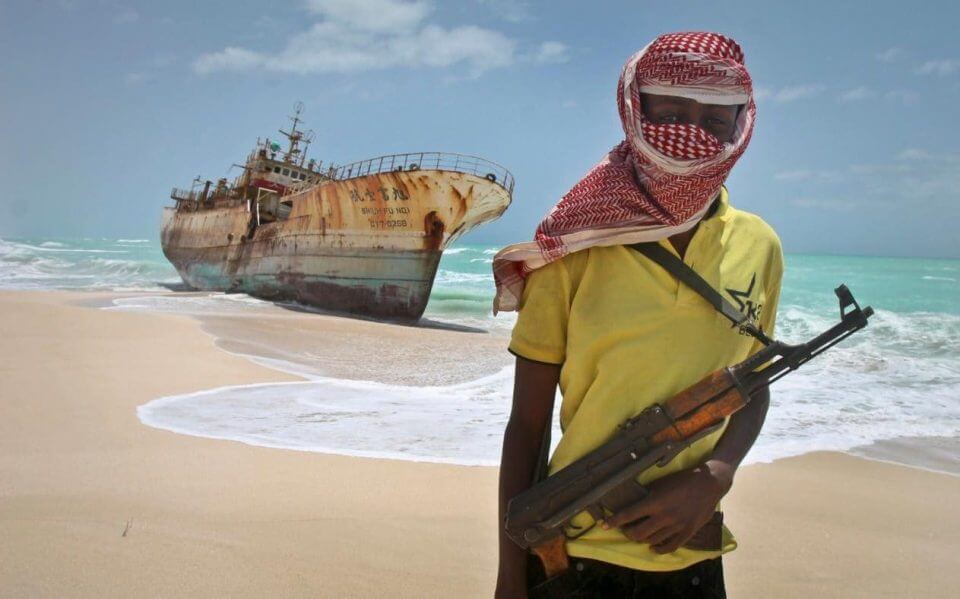
“My point was always, ‘Look, this is the hook.’ Piracy is the hook, if you want to get people interested in Somalia’s problems and the region’s problems; you’re not going to get them to read a World Food Programme treatise.”
Jay Bahadur became famous for, at age 24, traveling alone to Somalia to document the lives of the pirates raiding ships in the Gulf of Aden. He previously had little journalistic experience, no degree in the subject, and was on a tight budget. Nevertheless, his reports on the day-to-day lives and actions of the Somali pirates would appear in the world’s most widely-circulated newspapers from The New York Times to The London Times. He would later publish a book on the topic, which would inspire the Al Pacino film The Pirates of Somalia. On May 4th, he joined Merion West‘s Erich Prince to discuss his experiences and thoughts on both the situation in Somalia and on journalism itself.
Jay, good morning from Philadelphia and good afternoon to you in Nairobi. How are you?
Very good, hi, how are you?
Doing well, and thank you for joining us today for this interview. I’m looking forward to hearing your perspectives.
Great, very happy to be here.
To start off, I want to ask you about how you chose Somalia when you were considering destinations to pursue your first journalist project. You mention in your book some of the various conflict zones that were active at that time, places in the Middle East, including Afghanistan. I know you mentioned in one interview that you had been interested in Somalia since college, but what made you pull the trigger and decide to cover the Somali pirates once and for all?
So as you said I studied [the piracy situation] in school, and I was really fascinated. This is going to sound very nerdy, but I was fascinated by the outcome of one election in Somaliland, which is sort of the north-west of Puntland: a state that had declared independence, and they had held a presidential election. The president-elect won by eighty votes, and this result was disputed obviously and went to the Supreme Court of Somaliland. Somehow, it resolved peacefully, and that just stuck in my head as something that wouldn’t happen anywhere else in Africa—and really not very many places in the world: where you have a result that was completely peacefully respected.
So the plan was to go to Somaliland and to cover their next election, which was supposed to happen in 2012, I think. Then the whole piracy thing exploded, and that became a much sexier topic really. So, I ended up going to Puntland, which was the next door neighbor of Somaliland.
So then you get there, and I know it’s been fairly chronicled: the fact that before you left, you were able to make contact with some newsgroups there that turned out to be very helpful. Then you’ve mentioned the various ways you were able to ingratiate yourself or build rapport with some of the pirates. One of these ways was chewing this substance khat. In addition to that, what were some of the other aides that you used to be able to get the pirates to open up to you and trust you enough to share their stories?
Yes, an “aide,” that’s a nice way of putting it. Actually completely by chance, I was being hosted by the government of the ruling family. When I first planned to go over to Somalia, I had started calling up journalists, universities, and anyone I could really find online. I ended up connecting with a local journalist, who then tells me—just a few weeks before I’m about to take off for Puntland—that his father is in the local election. I said, “Okay, well, that’s great and good luck to him.”
And the next thing I know, he wins. So, by the time I landed, I was actually the guest of the ruling family of Puntland, who also happened to be the cousin pretty much, or, at least, someone with a very very close clan connection to some of these early pirates. So that was really the biggest “in” I had. It added a sort of clan stamp of approval. Since I was with the president’s family, they would almost only speak to me because they sort of treated me as a guest of the family.
And was this particular presidential administration very hostile to the pirates or was there an almost a co-existence between the two?
I mean in a way it wasn’t that relevant because the Puntland authorities, just like most authorities, in Somalia are quite weak and are not really able to control their coastline. Or if they were to shut down one area of pirate operations, it would just spring up somewhere else. So, their strategy was more—along with some of the pirates who again were connected by these clan ties—that they were trying to launch like a religious sort of P.R. So some of these pirates would go around with the local imams and basically preach about the ills of piracy. So it was a bit of a public awareness campaign that they were trying to launch. And this was sort of the best they could do because all-out control of the pirates was not an option for them or any other administration.
So it was more a matter of persuasion rather than actual teeth in trying to curb [the piracy] on the part of the Somali authorities?
Yeah they did. What ended up happening a few years later was they did create this anti-piracy force. But that was essentially all funded by a foreign country, by the United Arab Emirates. So that was something that was just kind of provided to them, as opposed to it coming out of their own policy to fund.
While I was there, it was more about a “hearts and minds” type of campaign. Boyah who became the main character in my book had embarked on this sort of religious redemption campaign. He was spreading this information about [piracy] being anti-Islamic. He was later put in jail, and my most recent news of him is that he has actually gone blind. And he is now an imam in Garoowe, the capital. And he is basically a full-time preacher now. So it may sound cynical [to suggest] that they were just preaching this stuff because they had no other choice or because they already made their money, but this guy [Boyah], he actually went all the way and became a real preacher.
So, this leads me to something I was hoping to ask you about. When you are referencing the inability of some Somali officials to actually curb the pirates, for these events taking place in international waters, who, which countries organizations, actually step-in and say, “We’re going to be the ones to solve this?”
Or is that part of the problem? As in, perhaps there is almost a diffusion of accountability among global players, each thinking someone else ought to handle it since this is in international territory.
Piracy is one of the few crimes that is actually considered of universal jurisdiction, so any nation, any on the high seas or on land can take responsibility for apprehending and prosecuting pirates. I think what you saw in the heyday of the [Somali] piracy situation is that many different and divergent nations coalesced around the Gulf of Aden in the Indian Ocean. China launched its first really deep water mission. You had Iran, India, Pakistan, and, of course, the European administrations. The E.U. has a naval force that’s still there on an anti-piracy mission. The United States too, obviously. There were a lot of different actors, who kind of settled on piracy as sort of an enemy they could all agree on.
But really what changed the dynamics in terms of what really led to the downfall in piracy and in pirate attacks was the use of armed guards aboard ships. This was an industry-driven initiative because no matter how many naval ships you send, you’re talking about an area sort of the size of Europe. It just was not feasible to try to control that amount territory with naval ships alone. But now what you are seeing recently is the hijackings have started again to increase. There were a couple major ones or major incidents in March and April last year and a few in recent months. This is because, I think ships, are starting to ignore the safety procedures, and they are starting to sail closer to Somalia without armed guards. So you’re seeing, I think, a bit of an uptick now in piracy because of that.
So in many respects, it was the industry’s response rather than the response of sovereign nations that reduced the piracy by kind of creating a disincentive for attacking these ships?
Yes, I think so. You had a lot of national government-driven initiatives that got the industry on board, for example. The Contact Group on Piracy was an effort in which they started developing what was called these best management practices, like where to sail, to travel in convoys, and to put up barbed wire. These were things that generally deter piracy, and there are tons. Obviously, the naval missions played a role in deterring attacks. In some instances, they actually rescued ships in the process of being attacked, but what really brought about the end to the crazy days of piracy in 2009, 2010, and 2011 was the use of armed guards, which was very much an industry-driven initiative. Initially, the industry was very much against the idea of armed guards because of the escalation it could provoke. But, in the end, you didn’t really see that escalation. Pirates didn’t tend to escalate tactics in response to being fired upon; they just tended to retreat, so it became a pretty common practice among the ships transiting that area.
So I want to ask you about the psychological mindset of some of the pirates. You’ve pushed back against this notion that they’re say money laundering their money in other cities and are a highly-organized crime syndicate. You have this description in your Globe and Mail piece of the mindset, and you quote the cousin of one pirate suggesting that the pirates think, “If I don’t get a Land Cruiser, it’s better to be dead.” You also suggest that their motivation for piracy is often immediate rewards from khat to women, rather than advanced money laundering schemes. Can you clear up some of these misconceptions you’ve alluded to about how we perceive these pirates in the West.
I mean there was a lot of reporting at the time, maybe not reporting, but it was taken for granted that pirates were sort of international kingpins; the leaders were London or Dubai or whatnot. And to some degree, their money did go outside the country, and there was some money invested in Nairobi where I live right now on property and things like that. But you had absolutely irrational reactions to piracy. For example, in Nairobi where I live, they were blamed by Kenyans for driving up property prices, which is ridiculous given how relatively little money there was, in the end, coming from piracy. And only a small percentage of that made it to Nairobi.
I think part of this misconception was due to the fact that Somalis are very transnational; I mean they live in many different countries. They’re very close in terms of clan and family connections, so inevitably some of that money is just spread around. But it was really no different than how money normally spreads among the Somali community, which is very international.
Now that your book has hit the shelves and you have received so much media attention, have you heard reactions from some of the people, some of these pirates, that you met and interviewed? Have they heard about some of the writings you published and do they have an opinion about it?
Well, I mean I’m sort of a well-known figure in Puntland—not to toot
my own horn. I am known among Puntland and Somaliland as someone who has definitely brought attention to the region, whether it’s good or bad—it varies. I mean I’ve got a lot of mixed reactions. I think generally the reaction to the book and especially the movie has been very positive. But there’s just this is the perception that, “Sure you’re writing about us, but you’re writing about us in a negative way. And that’s bringing dishonor.” My point was always, “Look, this is the hook.” Piracy is the hook if you want to get people interested in Somalia’s problems and the region’s problems; you’re not going to get them to read a WFP [World Food Programme] treatise.
My mission when writing the book was to tell the story of these individuals as honestly as possible and put in as much information as I could about the culture, what I observed about the people, their problems, their issues, and I think in the movie—I don’t know if you’ve watched the movie?
I did watch the movie. It was very good.
I think the movie portrays that very well. I think that especially has been extremely well-received by the Somali community regarding the pirates themselves. I mention this one figure Boyah who was in jail and is now apparently blind. I’ve been planning to catch up with him when I can because I do still travel there fairly frequently for work. I just haven’t been able to get around to it. One of the other [pirates] I interviewed was killed by the Iranian navy some years after I meet him. As for the others, I haven’t really had feedback from specific pirates, but it would be tough to track them down considering I don’t speak Somali. I don’t have their phone numbers anymore and all these things. But, Boyah, I would definitely like to meet up with them again. It’s just such an amazing evolution of his story that he’s now actually a preacher after everything that he went through. But that’s for the future.
You’ve sort of answered the question. But you’re not concerned to go back to the region after your exposés of sorts have been published? You’re not concerned that some of the pirates might be up?
It’s mostly the diaspora that is educated and can speak English and other languages, whose opinions [about the journalism] I’ve been exposed to. I wouldn’t be surprised if some of the pirates I interviewed have heard about the portrayal. I don’t think they were portrayed negatively by any means. I also changed a lot of names, so it’s unclear what would have gotten back to people whose names have been changed. The vast majority of the feedback I’ve gotten is from educated English-speaking diaspora members.
I want to turn to the film. In the beginning of the film—and I’m not sure how closely to your life it’s portraying you—the scenes depict you pitching stories to various literary magazines about a range of topics that have nothing to do with piracy. Do you still have plans to write about some of these topics, which are removed from Somalia or events on the high seas?
I don’t have any. Right now, I’m not really in journalism—not for publication at least. This is because I don’t want to be associated with my current job with my previous work. Right now, I work as an investigator for the U.N. in Somalia, and I’m doing very interesting work in a variety of fields, including terrorism, corruption, and humanitarian issues. I’m still working in Somalia. The work is very similar to journalism, but the audience is different in that we write for the UN Security Council. The reports are public, but the primary recipients or audience is the member states. So the audience is different, but the work is very similar.
I think it’s certainly good to branch out beyond piracy, when looking at Somalia. I hope [the work] is making a difference in the political development of the country and in the international community’s response to the country.
I’d love to write books again. It’s not something that I’ve given up on. I think the next steps I want to take are into fiction. For that, though, you need a little financial flexibility while you wait for your work to improve or to get published. At some point, I would love to write a novel set in Somalia. But that’s again for the future.
For our last question, you talked a lot about when you were looking to launch in journalism getting advice from journalists and basically them often telling you to you know go to where the news is, go to the conflict area. You know not necessarily go to grad school or whatever and go launch right into it. So I’m wondering now that the shoe is kind of on the other foot what advice would you give to young journalists would you give similar advice, and if so where are some of the spots in the world where they should go now.
I think it’s tough because though I kind of went off on my own and did my own thing, I ended up getting very lucky. Let’s be honest. The money has gone way down for print journalism. I mean even in a few years, the difference I noticed was really apparent. So that’s one thing. So, first of all, I just think it’s harder to make money in print, even if you get wildly successful or wildly lucky like I did.
Number two: I think in journalism nowadays, you really have to kind of learn how to do everything, which I can’t do. You have to do print, radio, 3D photography, videography. You have to be a jack of all trades, and then maybe you also have to toss in things like teaching a class or consulting or doing media work for the UN. So that’s really the work of a freelance journalist. I know very few successful pure print journalists, who are freelancing now, and obviously the pure foreign correspondent jobs are really just rapidly shrinking, even in the short time that I’ve lived in Nairobi.
Major bureaus have just folded up, left, and closed down what is really one of the main African hubs. I think that’s really tough. Another point is that, honestly, editors sort of abuse the bravery of freelancers. Things are so dangerous now, and some areas I would never recommend anyone in my wildest dreams go to—Syria is one example.
Even a lot of news agencies set a company policy where they won’t accept freelance work from Syria because they view it as too dangerous, which is quite a responsible thing to do. But, although there are some who still will, you’re encouraging freelancers to go to these kinds of areas, which I think is really not acceptable, especially as journalists have fewer and fewer protections from Islamic groups and armed groups. I wouldn’t say that I would discourage someone from going down my path, but I would certainly encourage them to think about it very carefully and make sure that they have someone backing and that they know the risks.
Thank you for joining us today, Mr. Bahadur.
Thank you. Take care.










